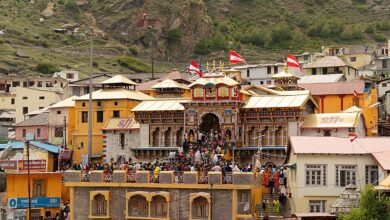Satyawadi Sant Kabirdas

Every word of Kabir’s poem came to challenge the hypocrisy of the hypocrites and the private shopkeepers of pretense and selfish fulfillment in the name of religion and went on flaunting untruth and injustice. Kabir’s sensible truth used to rain grenades on the superstitious people. Truth is also such that it becomes a question mark on the environment till date, it hurts and also removes errors.
14 June – Sant Kabirdas Jayanti: Medieval India’s independent great man, successful seeker, devout poet, philanthropist, social reformer Sant Kabirdas (born – Vikrami Samvat 1455, 1398 AD Kashi – death – 1518 Maghar) is the only poet of the Bhakti period of Hindi literature, who is a lifelong society. And is famous for keeping scorn on the rhetoric prevailing among the general public. Kabir was a 15th-century Indian mystic poet and saint, the originator of the poetic line of the Gyanashrayi-Nirgun branch in the Bhakti era of Hindi literature. His writings influenced the Bhakti movement in a new form in Hindi-speaking areas. Kabir, Kabir Das, Kabir Sahib and Sant Kabir etc. Famous in many names and forms, Kabir was an advocate of Karma-oriented society, whose glimpse is clearly visible in his works. Like a true world lover, his whole life was devoted to the welfare of the people. The biggest feature of Kabir was his unbounded speed and indomitable brilliance in his talent. This is the reason that even today Kabir is called the forerunner of the Jagran era.
Kabir, who is considered to be the guru of the ages in the field of sadhana, had created a new creation in the field of literature by showing the path of saint poetry. A sect named Kabirpanth is also prevalent in his name. The followers of his teachings are called Kabirpanthi and Kabirpanthis consider him to be a supernatural incarnated person. Many miraculous stories are also prevalent in relation to them. Kabir, who was equally critical of Hinduism and Islam, termed Yagyopaveet and circumcision as meaningless and strongly criticized religious practices like these. He was threatened by both Hindus and Muslims during his lifetime for such views.
It is noteworthy that no authentic biography of Kabir, the glorified personality of Hindi literature, has been found till date. Therefore, his life story is available only on the basis of the public opinion, some texts, various references and the introspective evidences available in some futuristic compositions. This is the reason that there is a difference of opinion among the scholars regarding his life story and also his opinion. According to the popular belief among the many legends about the birth of Kabirdas, Kabir was born as a child on a beautiful lotus flower in the Lahartara pond in Kashi. According to another belief, Kabir was a Muslim by birth and in his youth, under the influence of Swami Ramanand, he was introduced to Hinduism and then inclined towards Sanatan Dharma.
It is also a belief that Kabir was born with the blessings of Ramanand Swami from the womb of a Brahmini, a widow of Kashi, whom Ramanand ji had blessed to have a daughter by mistake. Brahmani threw that newborn baby near Lahartara Tal. Even scholars are not sure about Kabir’s parents. It is also not clear whether Kabir was the actual child of Neema and Neeru or whether Neema and Neeru only brought them up. It is said that Neeru the weaver had found this child lying on the Lahartara Tal, which he brought to his home and raised him. Later this child was called Kabir. Presenting himself in the form of a weaver, Kabir has said – Jati weaver name Kabira, bani bani firo udasi.
There is a popular belief about Kabir’s guru that Kabir was looking for a suitable guru. He wanted to make Vaishnava saint Acharya Ramanand his own guru but he refused to make Kabir his disciple, but Kabir decided in his mind that he would make Swami Ramanand his guru at all costs, for this Kabir thought in his mind. That when Swami Ramanand ji goes to bathe in the Ganges at four o’clock in the morning, at that time I will lie down on the stairs on the way to him and he did the same. It is said that one day, Kabir fell on the steps of Panchganga Ghat while staying at night. Ramanand ji was descending the steps to take bath in the Ganges when his feet fell on Kabir’s body. Immediately the word Ram-Ram came out of his mouth. Kabir accepted the same Ram Ram word as the initiation-mantra and accepted Ramanand ji as his guru. There is also a difference of opinion among scholars about his place of birth, but most scholars believe his birth in Kashi and Guru Ramanand only, which is also confirmed by this statement of Kabir himself – Pargat Bhaye in Kashi, Ramanand warns. Kabir is considered, in the Kabir Panth, as child-celibate and virani. According to this sect, Kamatya was his disciple and Kamali and Loi were his disciples. Kabir has also used the word Loi for blanket at one place. It is clear from this that Kabir had both a wife and a child.
It is known from public opinion that Kabir, by erasing the distinction of Hindu, Muslim, did satsang to Hindu devotees and Muslim mystics and assimilated the good things of both. According to legend, Kabir had a son Kamal and a daughter Kamali. He had to do a lot of work on his loom to take care of so many people. Kabir used to work as a weaver to earn a living. His work was a poet, a devotee, weaving yarn and making cloth. There used to be a gathering of saints in Kabir’s house, but Kabir was not educated. He himself has said – don’t touch the paper, don’t touch the pen. He himself did not write any texts, just mouth-watering and his disciples wrote it down. The glory of Ramnaam reverberates in all his thoughts. They believed in only one God and were vehemently opposed to the rituals. They did not believe in avatar, idol, fasting, Eid, Masjid, temple etc. And he chose these subjects to dissolve the juice in his verses.
The language of Kabir is Sadhukkadi. Their language includes the languages of all the dialects of Hindi language. There is a plurality of words of Rajasthani, Haryanvi, Punjabi, Khari Boli, Awadhi, Brajbhasha. The disciples collected his speeches in a book called Bijak, which has three main parts – Sakhi, Sabad (Pad), Ramani. Sakhi is a distorted form of the Sanskrit word Sakshi and is used in the sense of sermon. Most of the sakhis are written in couplets, but the use of Sortha is also found in it. Kabir’s teachings and principles are mostly expressed in Sakhi. Sabad is a lyrical verse in which there is complete musicality. In these, instead of preaching, emotion prevails, because in them Kabir’s love and intimate spiritual practice have been expressed. Ramani Chaupai is written in verses, in which Kabir’s mystic and philosophical thoughts have been revealed.
It is noteworthy that at the time of Kabir’s birth, the political, social, economic and religious condition of India was very pathetic. On the one hand, while the people were troubled by the bigotry of the Muslim rulers, on the other hand the religion was getting diminished due to rituals, legislation and hypocrisy of Hindu religion. There was a complete lack of devotion-feelings in the public. Pundits’ hypocritical words were widespread in the society. Kabir was born in the time of such struggle. During the appearance of Kabir, an unprecedented event had happened in the history of India, and this incident was the attack of a cruel sect like Islam in India, which non-Muslim infidels i.e. seem to be expedited.
This incident of attack of heretics, foreign dastardly, tyrants on peaceful people had shaken the Indian religion, Sanatan Vedic religion and social system badly. His karma-based caste system, which was considered immutable, was hit hard for the first time. The entire Indian atmosphere was agitated. Scholars were busy in finding the reason for this disturbance and were trying to handle Indian society and Sanatan Dharma, Vedic philosophy in their own way. At the same time, social reformer and saint poet Kabir arrived on this land of India. Every word of his poem came to challenge the hypocrisy of the hypocrites and the private shopkeepers of pretense and selfish fulfillment in the name of religion and went on flaunting untruth and injustice. Kabir’s sensible truth used to rain grenades on the superstitious people. Truth is also such that it becomes a question mark on the environment till date, it hurts and also removes errors.
Kabir had a strong belief that one gets his end in accordance with his deeds and not because of particular place. People believed that salvation is attained by dying in Kashi and not by dying in Magahar. But they believed in the principle of Karma Phal. To prove his belief, he went to Magahar in the end, because people believed that dying in Kashi leads to heaven and death in Maghar to hell. He breathed his last in Maghar. Even today the tomb and mausoleum located there are located. Kabir left his body at Magahar near Kashi. It is believed that after his death a dispute arose over his dead body. Hindus used to say that his last rites should be performed according to Hindu customs and Muslims used to say that according to Muslim rituals. Due to this controversy, when the sheet was removed from his dead body, then people saw a pile of flowers lying there. Later half of the flowers were taken by Hindus and half by Muslims. Muslims performed the last rites of those flowers in a Muslim manner and Hindus performed the last rites of those flowers in a Hindu manner. There is a tomb of Kabir in Magahar. Like birth, there are differences of opinion about his death date and event, but most scholars consider his death as 1575 Vikrami, accordingly, 1518 AD, but some later historians believe his death in Vikrami Samvat 1551, accordingly, 1494 AD and some 1448.
Fearful of Muslim terror and tyrannical havoc, Kabir attracted the Indian public towards Islam in a systematic manner with his poetic genres like verses, couplets, Soratha etc. and the public became his followers. Due to the language of poetry being simple intelligible, it started reaching the general public easily. This melodious blending of true knowledge facilitated the mutual meeting of both the sects. Yet, like them, their sects were and are against Muslim-culture and cow-eating. Kabir loved a peaceful life and was an admirer of virtues like non-violence, truth, virtue etc. Due to his simplicity, saintly nature and saintly nature, he is being respected in foreign countries as well.





